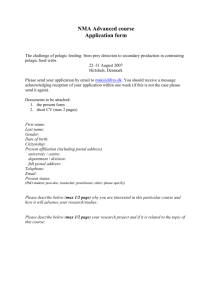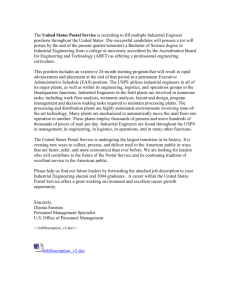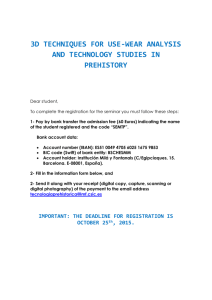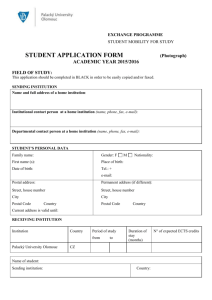CASE STUDY OF A DOMINANT POSITION IN THE POST MARKET
advertisement
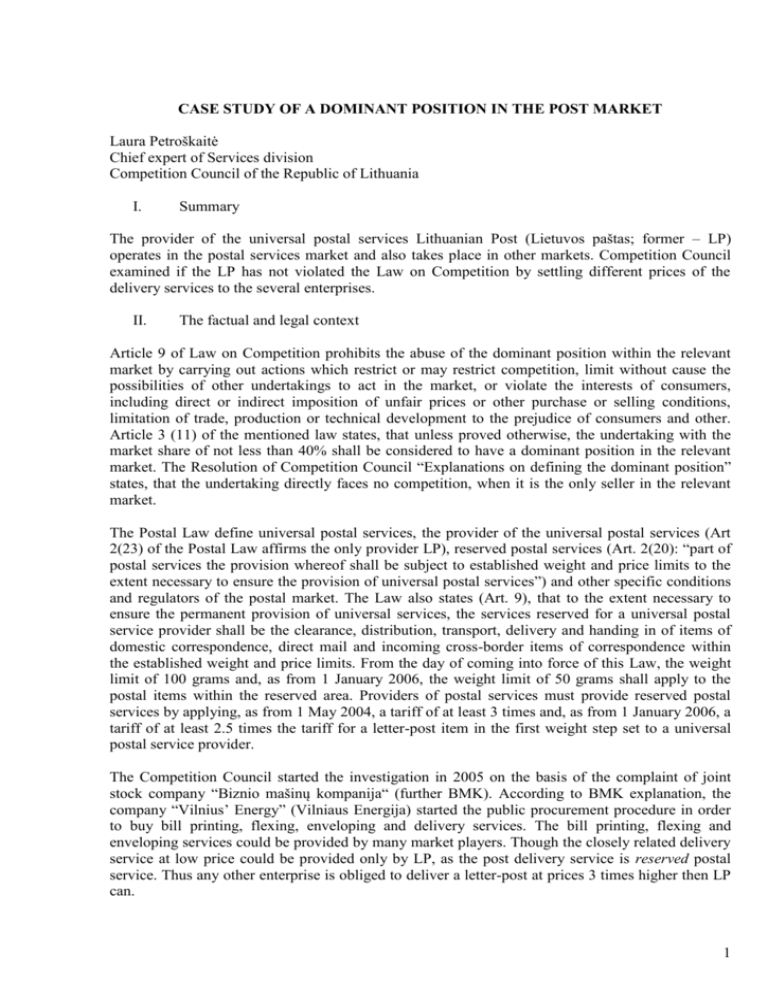
CASE STUDY OF A DOMINANT POSITION IN THE POST MARKET Laura Petroškaitė Chief expert of Services division Competition Council of the Republic of Lithuania I. Summary The provider of the universal postal services Lithuanian Post (Lietuvos paštas; former – LP) operates in the postal services market and also takes place in other markets. Competition Council examined if the LP has not violated the Law on Competition by settling different prices of the delivery services to the several enterprises. II. The factual and legal context Article 9 of Law on Competition prohibits the abuse of the dominant position within the relevant market by carrying out actions which restrict or may restrict competition, limit without cause the possibilities of other undertakings to act in the market, or violate the interests of consumers, including direct or indirect imposition of unfair prices or other purchase or selling conditions, limitation of trade, production or technical development to the prejudice of consumers and other. Article 3 (11) of the mentioned law states, that unless proved otherwise, the undertaking with the market share of not less than 40% shall be considered to have a dominant position in the relevant market. The Resolution of Competition Council “Explanations on defining the dominant position” states, that the undertaking directly faces no competition, when it is the only seller in the relevant market. The Postal Law define universal postal services, the provider of the universal postal services (Art 2(23) of the Postal Law affirms the only provider LP), reserved postal services (Art. 2(20): “part of postal services the provision whereof shall be subject to established weight and price limits to the extent necessary to ensure the provision of universal postal services”) and other specific conditions and regulators of the postal market. The Law also states (Art. 9), that to the extent necessary to ensure the permanent provision of universal services, the services reserved for a universal postal service provider shall be the clearance, distribution, transport, delivery and handing in of items of domestic correspondence, direct mail and incoming cross-border items of correspondence within the established weight and price limits. From the day of coming into force of this Law, the weight limit of 100 grams and, as from 1 January 2006, the weight limit of 50 grams shall apply to the postal items within the reserved area. Providers of postal services must provide reserved postal services by applying, as from 1 May 2004, a tariff of at least 3 times and, as from 1 January 2006, a tariff of at least 2.5 times the tariff for a letter-post item in the first weight step set to a universal postal service provider. The Competition Council started the investigation in 2005 on the basis of the complaint of joint stock company “Biznio mašinų kompanija“ (further BMK). According to BMK explanation, the company “Vilnius’ Energy” (Vilniaus Energija) started the public procurement procedure in order to buy bill printing, flexing, enveloping and delivery services. The bill printing, flexing and enveloping services could be provided by many market players. Though the closely related delivery service at low price could be provided only by LP, as the post delivery service is reserved postal service. Thus any other enterprise is obliged to deliver a letter-post at prices 3 times higher then LP can. 1 The BMK and other company, that wanted to make an offer in the public procurement, ought to buy delivery service from LP, as it was the cheapest way to deliver printed and enveloped bills. However, the LP itself tendered the delivery price even lower then the reserved delivery price officially approved by the Director of the LP. Other companies lost any possibility to win the public procurement. III. Procedural aspects The Competition Council collected information about the market from all public procurement participants, analysed legal acts, etc. Also National Regulator (Communications Regulatory Authority) provided Competition Council some consultation. IV. Abuse of a dominance Relevant market and dominance As already mentioned, Competition Council distinguished two markets: post printing, flexing and enveloping market and the post delivery market. There are no legal entrance barriers into the first one: every firm that has necessary equipment can enter and take part in this market. To the contrary in the post delivery market legal barriers exist: this field is constricted by Postal Law. As mentioned before, according to the Postal Law, the LP is the only provider of the universal services in Lithuania; therefore it has the right to sell reserved post delivery services at the lowest price. In the public procurement of “Vilnius’ Energy” participated 3 enterprise: the LP, the BMK and the National Centre of Settlements (Nacionalinis Atsiskaitymų Centras, hereinafter NAC). It is known, that 2 sheets of A4 format together with the envelop do not exceed 20g. Therefore the delivery of the “Vilnius’ Energy” bill of single A4 sheet automatically fulfils the condition of the reserved services. In the case of public procurement, the participants could buy the post delivery service exclusively from the LP. Therefore the Competition Council concluded that the LP has a dominant position in the reserved post services market. The full service of the bill printing and bill delivery definitely could be provided by 2 enterprises: bill printer and post deliver. These two markets are closely related and do not exist separately. Forasmuch only the LP provides reserved postal services, it can influence closely related bill printing and enveloping market. The consumers of the public procurer “Vilnius’ Energy” are the citizens of Vilnius. Thus they are the receivers of the printed and delivered bills. That implicates the territory where the market participants act, i.e. Vilnius region. Despite the LP operates in all Republic, in this particular case of public procurement, it could make an influence only to the Vilnius region. Abusive conduct of the LP The LP and its subdivisions provide the universal post services at prices, approved by the Government of the Republic of Lithuania. For the large clients (which provide 200-500 thousand of 20g mail to be delivered) the General Director of the LP has a right to approve the lower tariffs. According to the conditions and volumes given by “Vilnius’ Energy”, the delivery tariff to be applied was 0.65 LTL. Other enterprises were obliged to provide this service at 1.95 LTL (3 times higher). 2 Therefore the price offered by enterprises consisted of 2 parts: 1) bill printing and enveloping price and 2) bill delivery price, approved by the Director of the LP. „BMK“ asked the LP for cooperation and for possibly lower tariffs. The LP refused to supply other then officially approved tariffs arguing, that LP itself was going to participate in the public procurement. In the meantime the NAC, as a very large client, had an agreement with the LP on particular conditions on the reserved services. The prices that the enterprises offered to “Vilnius’ Energy” are shown in the table (prices in litas). Enterprises participating in the Price of 2 services for Final price public procurement one mail 1. BMK Prints and envelopes 0,18 0,76 LP delivers 0,58* 2. NAC Prints and envelopes 0,205 0,755 LP delivers 0,55 3. Prints and envelopes 0,18** 0,55 Delivers itself 0,37 3

